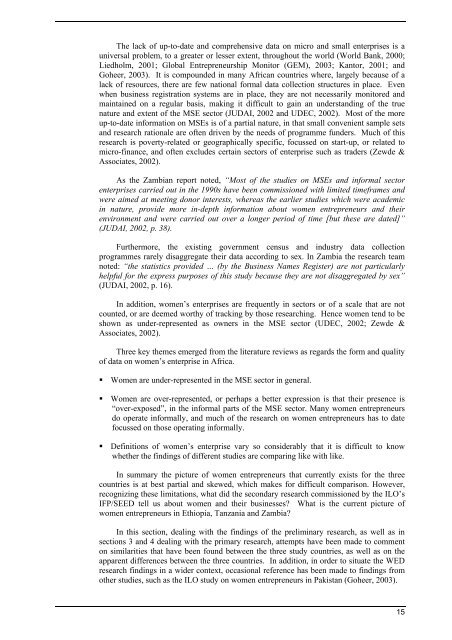The Challenges of Growing Small Businesses - International Labour ...
The Challenges of Growing Small Businesses - International Labour ...
The Challenges of Growing Small Businesses - International Labour ...
Create successful ePaper yourself
Turn your PDF publications into a flip-book with our unique Google optimized e-Paper software.
<strong>The</strong> lack <strong>of</strong> up-to-date and comprehensive data on micro and small enterprises is a<br />
universal problem, to a greater or lesser extent, throughout the world (World Bank, 2000;<br />
Liedholm, 2001; Global Entrepreneurship Monitor (GEM), 2003; Kantor, 2001; and<br />
Goheer, 2003). It is compounded in many African countries where, largely because <strong>of</strong> a<br />
lack <strong>of</strong> resources, there are few national formal data collection structures in place. Even<br />
when business registration systems are in place, they are not necessarily monitored and<br />
maintained on a regular basis, making it difficult to gain an understanding <strong>of</strong> the true<br />
nature and extent <strong>of</strong> the MSE sector (JUDAI, 2002 and UDEC, 2002). Most <strong>of</strong> the more<br />
up-to-date information on MSEs is <strong>of</strong> a partial nature, in that small convenient sample sets<br />
and research rationale are <strong>of</strong>ten driven by the needs <strong>of</strong> programme funders. Much <strong>of</strong> this<br />
research is poverty-related or geographically specific, focussed on start-up, or related to<br />
micro-finance, and <strong>of</strong>ten excludes certain sectors <strong>of</strong> enterprise such as traders (Zewde &<br />
Associates, 2002).<br />
As the Zambian report noted, “Most <strong>of</strong> the studies on MSEs and informal sector<br />
enterprises carried out in the 1990s have been commissioned with limited timeframes and<br />
were aimed at meeting donor interests, whereas the earlier studies which were academic<br />
in nature, provide more in-depth information about women entrepreneurs and their<br />
environment and were carried out over a longer period <strong>of</strong> time [but these are dated]”<br />
(JUDAI, 2002, p. 38).<br />
Furthermore, the existing government census and industry data collection<br />
programmes rarely disaggregate their data according to sex. In Zambia the research team<br />
noted: “the statistics provided … (by the Business Names Register) are not particularly<br />
helpful for the express purposes <strong>of</strong> this study because they are not disaggregated by sex”<br />
(JUDAI, 2002, p. 16).<br />
In addition, women’s enterprises are frequently in sectors or <strong>of</strong> a scale that are not<br />
counted, or are deemed worthy <strong>of</strong> tracking by those researching. Hence women tend to be<br />
shown as under-represented as owners in the MSE sector (UDEC, 2002; Zewde &<br />
Associates, 2002).<br />
Three key themes emerged from the literature reviews as regards the form and quality<br />
<strong>of</strong> data on women’s enterprise in Africa.<br />
• Women are under-represented in the MSE sector in general.<br />
• Women are over-represented, or perhaps a better expression is that their presence is<br />
“over-exposed”, in the informal parts <strong>of</strong> the MSE sector. Many women entrepreneurs<br />
do operate informally, and much <strong>of</strong> the research on women entrepreneurs has to date<br />
focussed on those operating informally.<br />
• Definitions <strong>of</strong> women’s enterprise vary so considerably that it is difficult to know<br />
whether the findings <strong>of</strong> different studies are comparing like with like.<br />
In summary the picture <strong>of</strong> women entrepreneurs that currently exists for the three<br />
countries is at best partial and skewed, which makes for difficult comparison. However,<br />
recognizing these limitations, what did the secondary research commissioned by the ILO’s<br />
IFP/SEED tell us about women and their businesses? What is the current picture <strong>of</strong><br />
women entrepreneurs in Ethiopia, Tanzania and Zambia?<br />
In this section, dealing with the findings <strong>of</strong> the preliminary research, as well as in<br />
sections 3 and 4 dealing with the primary research, attempts have been made to comment<br />
on similarities that have been found between the three study countries, as well as on the<br />
apparent differences between the three countries. In addition, in order to situate the WED<br />
research findings in a wider context, occasional reference has been made to findings from<br />
other studies, such as the ILO study on women entrepreneurs in Pakistan (Goheer, 2003).<br />
15
















